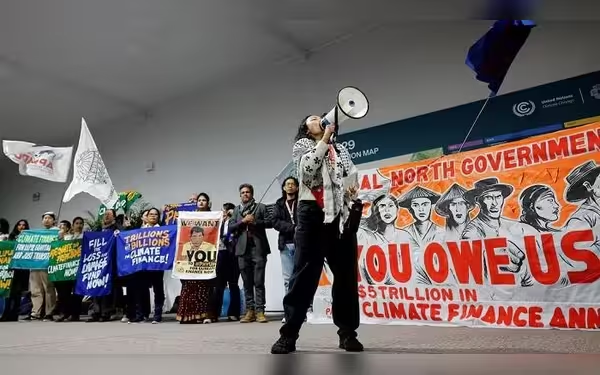Saturday, November 16, 2024 07:40 PM
Climate Finance Urgency: $1 Trillion Needed for Developing Nations
- Developing nations require $1 trillion annually for climate action.
- Immediate financial support is crucial for vulnerable communities.
- Investing in green technologies fosters economic growth and resilience.
 Image Credits: thenews.com.pk
Image Credits: thenews.com.pkDeveloping nations need $1 trillion annually for climate action. Immediate support is essential for a sustainable future.
Climate change is one of the most pressing issues facing our planet today. As temperatures rise and extreme weather events become more frequent, the need for action has never been more urgent. Developing nations, in particular, are feeling the brunt of these changes, often lacking the resources to adapt and mitigate the impacts. A recent report has highlighted the critical financial support needed to help these countries transition to greener energy sources and protect their populations from the devastating effects of climate change.
During climate talks held in Baku, negotiators emphasized the importance of immediate financial assistance for poorer countries. Experts have warned that these nations require at least $1 trillion annually by the end of the decade to effectively combat climate change. This staggering figure is not just a number; it represents the lifeline that many vulnerable communities need to survive and thrive in an increasingly unpredictable world.
The report from the Independent High-Level Expert Group on Climate Finance sets a clear target: by 2035, the annual financial requirement could rise to $1.3 trillion or even more if countries delay their commitments. This means that the time to act is now. If wealthier nations do not step up to provide the necessary funding, the costs will only escalate in the future, leading to more severe consequences for both the environment and global stability.
It is essential to understand that investing in climate resilience is not merely an act of charity; it is a strategic move that benefits everyone. By helping developing nations transition to sustainable energy, we can reduce global greenhouse gas emissions, which ultimately protects the planet for future generations. Moreover, fostering green technologies in these regions can create jobs and stimulate economic growth, proving that environmental responsibility and economic development can go hand in hand.
The call for $1 trillion a year in climate finance is not just a plea for help; it is a necessary step towards a sustainable future. As we face the realities of climate change, it is crucial for all nations to recognize their role in this global challenge. The time to act is now, and the choices we make today will shape the world of tomorrow. Let us not wait until it is too late; instead, let us invest in a greener, more resilient future for all.













